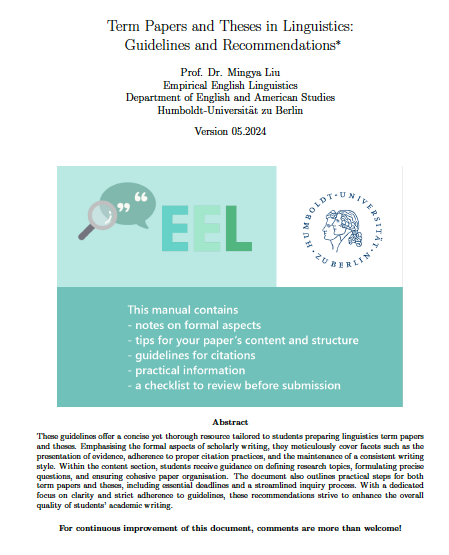For students
On this page you will find information on 1) Arbeitsnachweise (proof of course work), 2) recommendation letters, and 3) how to contact me as a potential thesis supervisor, as well as a document with guidelines and recommendations on term papers and theses in linguistics.
Arbeitsnachweise (proof of course work):
Please see to getting your Arbeitsnachweise signed during the teaching period.
1. If you have missed the deadline and would like to contact me for a signature, you need to include the following information in the email: the title and the semester of the course that you have taken with me, the proof that you have fulfilled all the requirements, see the course information on Moodle.
2. You can drop your Arbeitsnachweise in my mailbox and pick it up later at our secretary Ms. Röthke's office (https://www.angl.hu-berlin.de/department/staff-faculty/administrative/roethke).
Recommendation letters:
I am happy to write a recommendation letter for you, presupposing that you have taken at least one course with me.
1. If you need one, please write me an email at least three weeks before the application deadline with the following information: courses you have taken with me and grades, institution of your application.
2. If I agree to write a letter for you, you need to send me another email with the following information (as one PDF): cover letter/letter of motivation, CV, academic record, study or research plan, and all the other necessary information I need to have.
Thesis supervision (general information & form of inquiry):
- If you are looking for a topic and supervisor for your bachelor’s or master’s thesis, the first step is to check the essential information available on our department’s website, including a list of potential supervisors.
- I regularly offer consulting workshops on "Writing a thesis in linguistics: Q&A (voluntary session for students)" tailored to all levels (BA/MEd/MA). You are cordially invited to attend with all your questions, even if you do not plan to write your thesis under my supervision.
- If you are considering the possibility of writing your thesis under my supervision, please first read "Term Papers and Theses in Linguistics: Guidelines and Recommendations",
and then submit an inquiry via email with the subject line "Inquiry for thesis supervision - your full name" and the following details:
- what subjects (major and minor) you study and in which semester,
- what linguistic courses you have taken so far, and what linguistic courses in which semester you have taken under my instruction,
- 1 or 2 possible topics in order of preference, each with a short reference list of 2-5 papers, taking into account the courses you have taken, and
- a preliminary time plan (i.e., when you will have all the requirements fulfilled, when you plan to start with, write and submit the thesis, and when you will need the grade).
